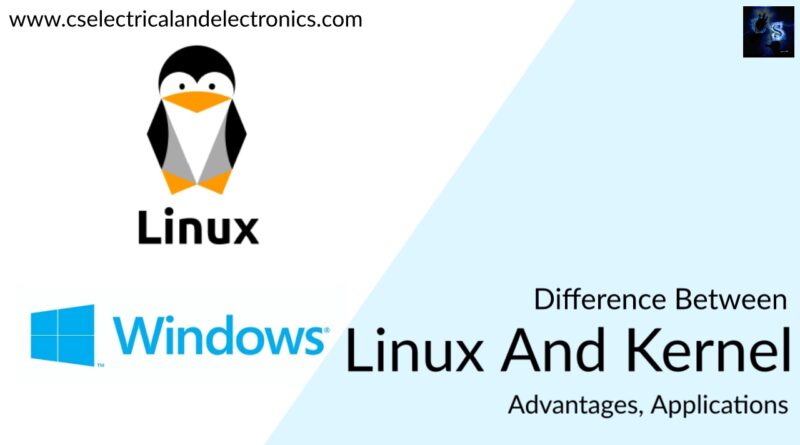Difference Between Windows And Linux, Advantages, Applications
Hello guys, welcome back to my blog. In this article, I will discuss the difference between Windows and Linux, the advantages of Linux, applications of Windows and Linux, why Linux is used.
If you have any doubts related to electrical, electronics, and computer science, then ask questions. You can also catch me @ Instagram – Chetan Shidling.
Also, read:
- What Is Inter-Process Communication In Operating System, Purpose
- Top Linux Commands For Engineers, Useful Linux Commands Asked
- Top 10 Artificial Intelligence AI Tools For Stock Market Traders, Investors
Difference Between Windows And Linux
An operating system is a type of low-level system software that manages the hardware and software resources of a computer and supports basic activities such as task scheduling, resource management, memory management, peripheral control, networking, and so on.
It serves as a link between the hardware and software of a computer. A computer’s operating system is the most important component. Any computer or mobile device cannot function without an operating system!
The Linux kernel is the foundation for a variety of Unix-like operating systems. It is part of the free and open-source software family. It’s commonly included as part of a Linux distribution. In 1991, Linux was released for the first time. Although it is most typically used for servers, Linux also has a desktop version.
Windows Architecture
Windows architecture consists of two layers:
- User mode
- Kernel-mode
User Mode
User mode has integral subsystems and environment subsystems.
Fixed system support processes (such as session manager and login), service processes (such as task scheduler and print spooler service), the security subsystem (for security tokens and access management), and user applications are all integral subsystems.
The environment subsystem serves as a connection between user-mode applications and OS kernel services. For LINUX, there are four main environment subsystems: Win32/, POSIX, OS/2, and the Windows subsystem.
Kernel Mode
Kernel mode has full access to the computer’s hardware and resources. It runs the code in secure memory space. Executive, microkernel, kernel-mode drivers, and hardware abstraction layer are all part of it (HAL).
The executive functions in Windows are further separated into subsystems. Memory management, I/O management, thread management, networking, security, and process management are among their primary responsibilities.
Linux Architecture
There are two layers in the Linux architecture: user space and kernel space. Hardware, kernel, System call interface (called Shell), and User programs or utilities are the four basic components inside these levels.
All peripheral devices connected to the computer, such as terminals, printers, CPUs, and RAM, are considered hardware. The monolithic Kernel, which is the OS’s core, is next.
There are numerous subsystems and other components in the Linux kernel. Process control, networking, accessing peripherals and the file system, security management, and memory management are just a few of the key duties it handles.
Linux’s speed can be ascribed to the fact that it runs on the majority of the world’s fastest supercomputers. Linux is regarded for being fast and fluid, but Windows 10 has a reputation for being increasingly slow over time.
Linux has a modern desktop experience and operating system attributes that are faster than Windows 8.1 and Windows 10, whereas Windows is slow on older hardware.
Overall, Linux outperforms Windows in terms of basic OS capabilities such as thread scheduling, memory management, i/o handling, file system management, and core tools.
Key Difference Between Windows And Linux
The key difference between Windows and Linux include the following.
- Because Linux is an open-source operating system, the operator can readily edit source code to meet his or her needs, whereas Windows is a commercial operating system, and the operator does not have access to source code.
- Because Linux OS discovers and patches problems, it is far more secure than Windows OS, which has a large user base and thus becomes a target for hackers.
- Even with older hardware, Linux is faster than Windows. In Linux, peripherals are treated as files, whereas in Windows, they are treated as devices.
- In Linux, files with the same name can be found in the same dictionary, however, in Windows, two files with the same name cannot be found in the same folder.
- The program files and system in Linux can be found in several places, although the program files and system in Windows OS are usually saved in the C drive.
Why is Linux faster than Windows?
Linux is often faster than Windows for a variety of reasons. To begin with, Linux is quite light, whereas Windows is heavy. A lot of programs operate in the background in Windows, and they take up RAM.
Second, the Linux file system is extremely well organized. Files are grouped in chunks that are quite near to one another. The read-write operations become extremely rapid as a result of this. Windows, on the other hand, is a dumpster, and files are strewn about.
To summarise, Linux provides excellent speed and security, whereas Windows provides excellent simplicity of use, allowing even non-technical individuals to operate efficiently on home PCs.
Many corporate businesses utilize Linux as a server and operating system for security reasons, whereas Windows is mostly used by business users and gamers. When it comes to cost, there are numerous aspects to consider when comparing the costs of these two operating systems.
We can’t say with certainty that Linux is completely free or less expensive than Windows. The cost of a Linux license is free, but both Windows and Linux have the infrastructure, software support, and IT manpower costs.
This is was about ” Difference Between Windows And Linux “. I hope this article may help you all a lot. Thank you for reading.
Also, read:
- 100 + Electrical Engineering Projects For Students, Engineers
- 100+ C Programming Projects With Source Code, Coding Projects Ideas
- 1000+ Electronics Projects For Engineers, Diploma, MTech Students
- 1000+ Interview Questions On Java, Java Interview Questions, Freshers
- 1000+ MATLAB Simulink Projects For MTech, Engineering Students
- 500+ Embedded System Projects For Engineer, Diploma, MTech, PhD
- 500+ Projects For Diploma Electrical, Electronics Student, Diploma Project
- 8051 Microcontroller Timers, TCON Register, TMOD Register
Author Profile
- Chetu
- Interest's ~ Engineering | Entrepreneurship | Politics | History | Travelling | Content Writing | Technology | Cooking
Latest entries
 All PostsApril 19, 2024What Is Vector CANoe Tool, Why It Is Used In The Automotive Industry
All PostsApril 19, 2024What Is Vector CANoe Tool, Why It Is Used In The Automotive Industry All PostsApril 13, 2024What Is TCM, Transmission Control Module, Working, Purpose,
All PostsApril 13, 2024What Is TCM, Transmission Control Module, Working, Purpose, All PostsApril 12, 2024Top 100 HiL hardware in loop Interview Questions With Answers For Engineers
All PostsApril 12, 2024Top 100 HiL hardware in loop Interview Questions With Answers For Engineers All PostsMarch 22, 2024Driver Monitoring Systems In Vehicles, Working, Driver Sleepy Alert
All PostsMarch 22, 2024Driver Monitoring Systems In Vehicles, Working, Driver Sleepy Alert








